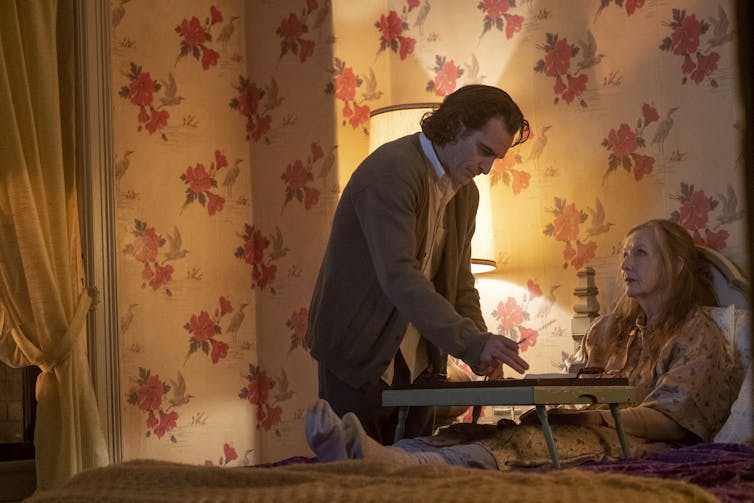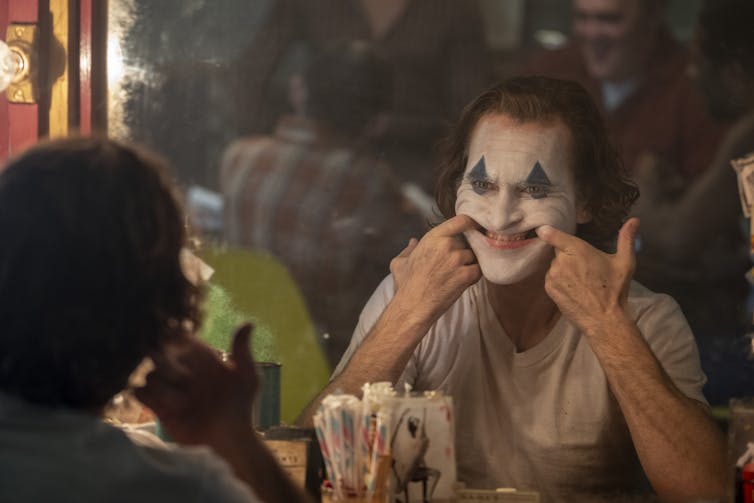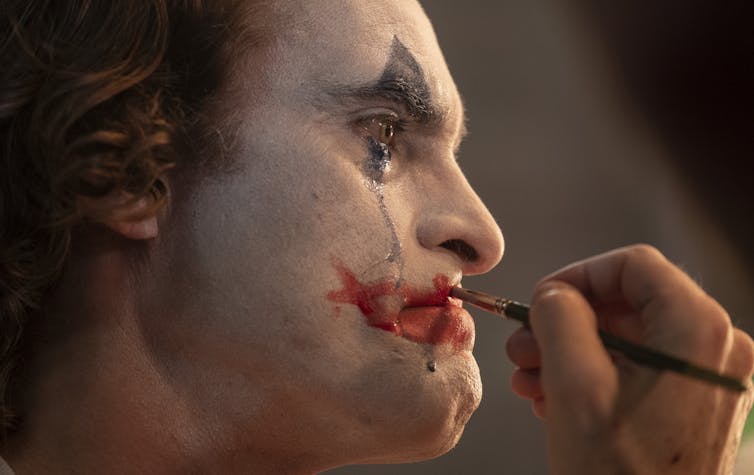The backlash against the backlash has begun. Joker, starring Joaquin Phoenix and directed by Todd Phillips of Hangover trilogy fame, has opened to conflicting reviews and negative press.
Having been hailed as a masterpiece when it first screened at the Venice film festival (and drawing an eight-minute standing ovation), a slew of anxious commentaries have since worried about the film’s potential to incite mass shootings and civilian violence. Since its general release, the tide has begun to turn once again in favour of the film, suggesting that the general public is far more capable of discerning the difference between social commentary and incitement to violence than some pundits believe.
The film takes the iconic comic book villain from the Batman series, and traces his evolution from the failed comic, Arthur Fleck, to the devilish monster, ‘Joker’. Despite its roots, the film is far more concerned with how evil manifests in the real world than with comic book villainy, offering a compelling portrayal of the failure of a certain ideal of white, American masculinity.

This ideal, witnessed in the Hollywood tradition from Clint Eastwood to Sylvester Stallone, posits an image of the successful American male as virile, violent, and economically independent. These men are agents of violence for the benefit of society, figures who protect American values against perceived threats from the outside using extreme force.
Having now seen the film, I think the controversy around it speaks to a certain hypocrisy around the depictions of violence – we like our violence slick and stylish, and don’t want to have to think about our role in creating the individuals who commit it. Amazingly, Joker does just this.
Male violence
The first half of Joker takes the viewer on a journey through the many ways Fleck falls drastically short of the American male ideal.
A gang beats him up; he has an ill-defined mental illness, takes prescription drugs, and sees a counsellor; his colleagues bully him. Significantly, he is feminised – he lives with and cares for his mother, in what we are invited to view as Norman Bates-esque creepiness. The viewer also watches him dancing, his semi-naked body an emaciated form put on display as it gyrates and contorts before the camera.
The film reflects what sociologist Michael Kimmel calls the “aggrieved entitlement” of the white American male, where the failure to procure the social status and goods you believe you deserve (money, employment, property, sex, family), leads to anger and violence at groups you blame – women, people of colour, sexual minorities.
And so it is no surprise that some are troubled by Fleck’s close approximation to incels (involuntary celibates). It has been suggested that in the character of Joker, incels could find a ‘patron saint’ who embodies many of their supposed traits: isolation, anger, lack of employment, and failure to attract women.
Films like Joker – and antecedents such as Fight Club, which has been taken up as an icon by white supremacist groups in the US – invite us to question the line between reality and fiction. Do such films reflect social conditions or do they, in the end, help create them?
Sympathy for the devil
Much of the debate around Joker’s potential to inspire “copycat” violence has centred on the film’s apparent “empathy” or “sympathy” for Arthur Fleck. The theory goes that violent-minded young loners will see Fleck and try to emulate his actions.
But the audience is not encouraged to empathise with Fleck. Film techniques that encourage the audience to identify with a character, such as point-of-view shots and close ups, rarely occur in Joker. Instead, we see Fleck through a range of distorted surfaces, such as windows, mirrors, and television screens.

Fight Club’s main characters were buff, brawny, articulate leaders of a movement. Fleck’s body, by contrast, is a grotesque object of disgust. His skinny form as it contorts and writhes is difficult to watch, and we also witness black bruises, snot dripping from his nose, grainy and caked clown make up. His laugh, initially a curiosity, makes you writhe in your seat by the end of the film. Certainly, there are times when we pity his situation, and may feel moved to condemn the social conditions that contribute to his isolation. But we want to turn away from this man, not become like him.
This is where the suggestion that the film tries to incite incel violence fails. Commentators appear to have forgotten that how “we”, larger society, see people like incels and other extremists, is not the way they see themselves. Threads on 4chan (a website that hosts an incel forum) have said that comparing incels with Joker showed how wider society viewed them — as monsters.
Heroes and villains
People who commit acts of violence on behalf of an ideology don’t imagine themselves as lonely, depressed, unattractive, and physically weak men like Fleck – they join these movements to leave such inadequacies behind. They imagine themselves in the guise of the cowboy, the Terminator, Rambo, the American sniper – heroes fighting the forces of “evil”.
And so there is a deep hypocrisy in certain responses to Joker, a film which, in the end, contains far fewer scenes of violence and death than any Tarantino film. Joker is not a satire, nor is its violence “cool”. Our witness of the dank and depressing origins of the movement overshadows everything.

Fleck’s story disrupts any easy distinction between “good” and “evil”, a narrative mainstay of Hollywood film from Westerns to Marvel. The problem with the heroes and villains narrative is that there is no responsibility required on the part of the viewer or the other characters — some folks are born bad and deserve what they get.
Fleck is evil, ugly, and cynical. But so is the world he lives in, a world whose inequality and cruelty towards the most vulnerable in society finds echoes with our own. Perhaps we condemn Joker because the elevation of a spiteful, selfish, and narcissistic caricature of a man to a state of power feels painfully, and shamefully, close to home.
Maria Flood, Lecturer in Film Studies, Keele University
This article is republished from The Conversation under a Creative Commons license. Read the original article.














